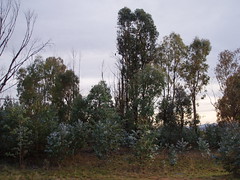The present collapse in Managed Investment Scheme’s was inevitable. The power of the tax system saw companies like Gunns planting trees around the clock in years gone by, just to meet the immense demand from tax-minimising activities. Kohler wrote in 2004 that upwards of 10 million gum trees were planted in the 10 preceding years, making then Taxation Commissioner Michael Carmody Australia’s most powerful greenie.
There was a 93% surge in money invested with MIS’s in 2003/04 (Australian Agribusiness Report 2004). Plantations could hardly keep up with the dual seller of ‘doing something good for the environment’ and engaging in ‘tax minimisation’.
Business Spectator’s David Leyonhjelm says in the Great Southern Sell-Off:
The MIS scheme was originally introduced to allow compensation for investors who otherwise would have to wait 10 years or more for their investment to mature. But many investments were made solely for the tax breaks rather than the investment itself. Some clever practices also emerged, such as non-recourse and round-robin funding, which gave the whole subject a bad name.
Beside the outrage over 10% commissions to financial investors, the big issue is the abuse of the taxation system to provide tax loopholes for tax dodgers. No wonder the social contract is under threat.
Such tax incentives saw the price of agricultural land bid upwards. Plantations were undertaken in areas where a $240 access fee could enable a company like Timbercorp to rip unlimited amounts of water from underground acquifers. I remember meeting locals in Warnambool in tears that thousands of litres of water were being wasted, running down the middle of roads due to poorly managed tree farms.
Whilst the private interests of the well-to-do were well served by such activities, the public interest was left high and dry. Many local farmers understood that mono-culture plantations were susceptible to disease. They also knew that the tight planting formations would limit the girth of trees, making them less productive in the long run.
The massive amount of cheap finance the tax loophole provided these agri-businesses gave them a competitive advantage when competing for scarce land. Farmers were bound to lose out.
Will the public interest be served with the looming policy conundrum that various Senate Inquiries will undertake?
Would an environmental trust type body be willing to buy the plantations back with the aim of creating carbon sinks? Some selective culling and replacement with a diversity of understories could ensure the few short years some have been growing for are not lost.
These potential carbon sinks and the carbon credits they will deliver in years to come will be very valuable. Let’s hope that entities with the public’s best interest gain access to these sites rather than aluminium smelters buying in at bargain prices as carbon minimisation strategies.
The tax system must be used to both reward private endeavour and the public interest in a clean, equitable society.
